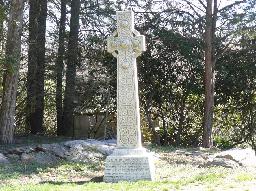Carnegie, Andrew |
| STEEL MAGNATE, PHILANTHROPIST (SCOTLAND) |
|
BORN 25 Nov 1835, Dunfermline, Fife - DIED 11 Aug 1919, Lenox, Massachusetts GRAVE LOCATION Sleepy Hollow, New York: Sleepy Hollow Cemetery, 540 North Broadway |
|
Andrew Carnegie was born in Scotland. His family moved to the USA when he was still a child. He made a quick career at the Pennsylvania Railroad Company and started investing at an early age. During the Civil War he was Superintendent of the Military Railways and the Eastern telegraph lines. In 1864 he invested $40,000 in a company called Storey Farm on Oil Creek in Pennsulvania, resulting in cash dividends of $1,000,000 in one year. After the war he started developing iron works and this made him very rich. In 1870 he founded the Carnegie Steel Company. Paying low salaries to his employees the company was extremely profitable and grew rapidly. Apart from ruinning his company, Carnegie published articles in magazines and in "Triumphant Democracy" (1886) he stated that the US republican system was superior to the British monarchal system. In his article "Wealth" (1889) he argued that and industrialist should first acquire wealth and later in life distribute this wealth to good causes. Requested by Prime Minister Gladstone, the article was republished in England as "The Gospel of Wealth". Carnegie sold his company to J.P. Morgan in 1901 and turned into a philanthropist, using his immense fortune to build libraries, provide education and support scientific research. In 1903 he contibuted $1,500,000 to the creation of the new Peace Palace at The Hague in The Netherlands. At the time of his death he had given away most of his fortune. Related persons • knew Archenhold, Friedrich Simon |
| Images |
Sources • Adler, Josef, Handbuch der Grabstätten, 2. Band, Die Grabstätte der Europäer, Deutsches Kunstverlag, München, 1986 • Find-A-Grave • Andrew Carnegie - Wikipedia (EN) |



